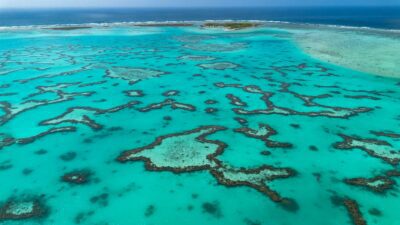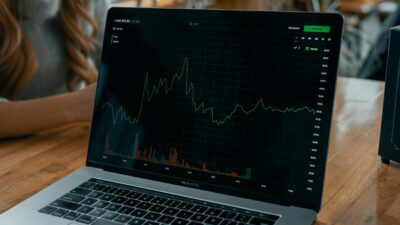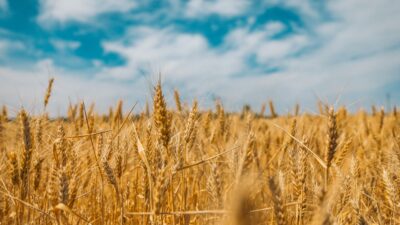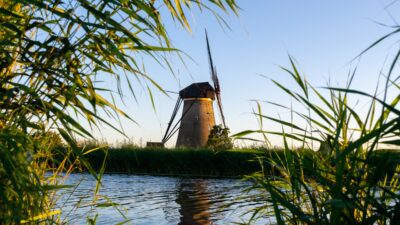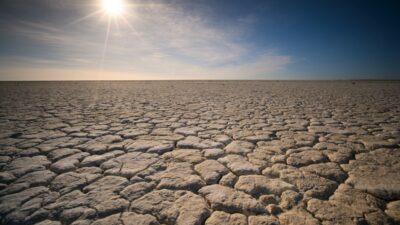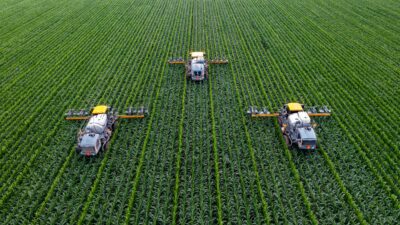Sandra Peter and Kai Riemer

The future of sand
This week: the world is running out of sand. The most-exploited resource after water should be recognised as a strategic material and regulated like a mineral commodity.
Sandra Peter (Sydney Business Insights) and Kai Riemer (Digital Futures Research Group) meet once a week to put their own spin on news that is impacting the future of business in The Future, This Week.
The stories this week
05:45 – UN report on sand and sustainability
Other stories we bring up
Ukraine invasion threatens global wheat supply
Heat waves are scorching India and Pakistan this week
India’s giant heat wave is having ripple effects for the world’s food supply
Brazil’s Amazon deforestation hits April high, nearly double previous peak
Billionaire Mike Cannon-Brookes has acquired 11% of AGL
The global impact of mining construction minerals on biodiversity paper
We extract 50bn tonnes of sand and gravel every year
The deadly global war for sand (2015)
Reuters on the sand crisis 2022
Why the world is running out of sand on BBC
UN warns of looming sand crisis as population and city growth lead to surging demand
The University of Sydney Business School’s six megatrends
The climate and resource security megatrend
Our previous mention of the sand crisis in 2019 on The Future, This Week
Follow the show on Apple Podcasts, Spotify, Overcast, Google Podcasts, Pocket Casts or wherever you get your podcasts. You can follow Sydney Business Insights on Flipboard, LinkedIn, Twitter and WeChat to keep updated with our latest insights.
Send us your news ideas to sbi@sydney.edu.au.
Music by Cinephonix.
Dr Sandra Peter is the Director of Sydney Executive Plus at the University of Sydney Business School. Her research and practice focuses on engaging with the future in productive ways, and the impact of emerging technologies on business and society.
Kai Riemer is Professor of Information Technology and Organisation, and Director of Sydney Executive Plus at the University of Sydney Business School. Kai's research interest is in Disruptive Technologies, Enterprise Social Media, Virtual Work, Collaborative Technologies and the Philosophy of Technology.
Share
We believe in open and honest access to knowledge. We use a Creative Commons Attribution NoDerivatives licence for our articles and podcasts, so you can republish them for free, online or in print.
Transcript
Disclaimer We'd like to advise that the following program may contain real news, occasional philosophy and ideas that may offend some listeners.
Sandra So turns out the world is running out of sand.
Kai And while sand is boring per se, this is not only surprising, but it is a big deal.
Sandra We can't not talk about sand.
Kai So sand it is.
Intro From The University of Sydney Business School, this is Sydney Business Insights, an initiative that explores the future of business. And you're listening to The Future, This Week, where Sandra Peter and Kai Riemer sit down every week to rethink trends in technology and business.
Kai So before we talk about sand, there are a few things that we should be mentioning
Sandra Gravel?
Kai No, but heat.
Sandra Heat, a huge heatwave has hit India with sustained temperatures over 40 degrees over a number of days, which has had a very serious impact, not only on the loss of human life, but also on agriculture, on food crops and in particular, wheat. And this is quite concerning, because we've spoken about wheat in the context of the conflict in Ukraine, a lot of wheat is grown in Ukraine, and indeed, in Russia.
Kai And while weed would still be growing in Ukraine and Russia, it's increasingly hard to get it out of those countries.
Sandra Not only because of the challenges of, you know, infrastructure being destroyed, and access to ports, and so on, but even if you do manage to get ships somehow into the Black Sea, and, you know, load them up with wheat, fewer and fewer companies can afford the insurance required to have ships in a war zone.
Kai And to me, that is really surprising, right? That it would come down to insurance as a problem, you know, not being able to feed the world.
Sandra It comes down to the business side of things, right, the economics of getting it out rather than...
Kai Of doing business with a warzone.
Sandra But back to the heatwave in India, this will have not only the huge human costs, but the huge economic costs that will have an impact beyond the Indian subcontinent, right. As we've mentioned, with the wheat coming out of Russia and Ukraine, the hit that the Indian wheat crops are taking will also impact the price of grains and the food shortages that are now being projected to be some of the greatest in history. And this will impact the parts of the world that are net importers of these things, many countries in Africa and the Middle East, that will suffer the most and that have the least ability to accommodate growing food prices or challenges with supply chains.
Kai We could be talking about billionaires buying things.
Sandra Not more Elon Musk, please.
Kai No, no, not.
Sandra Let's take a break from Elon Musk for one week.
Kai Not rocket man buying bird app. This is Mike Cannon-Brookes, one of the two co-founders of Atlassian, who through his family trust is buying a sizable share in Australian energy company AGL.
Sandra Mike Cannon-Brooke’s interest in AGL is around AGL's climate footprint. AGL is the largest greenhouse gas emitter in Australia by, by a long mile.
Kai And the reason is its coal-fired power plants.
Sandra And Mike Cannon-Brookes has always been outspoken about the fact that there is not enough done to move AGL and to move Australia indeed out of fossil fuels. So this move...
Kai This is an activist move of a concerned billionaire using his fortune to basically force this company to change away from coal faster.
Sandra Curious to see how this one ends up turning out. In the meantime, we need a billionaire to look after the Amazon rainforest, because in additional climate news this week and resource news, deforestation has hit a new record. So Brazil's Amazonian jungle, the deforestation in April hit double the previous peak. It's really astonishing just how quickly this has moved to a new high. This is the third monthly record this year after we've seen records over the past couple of years. Part of it due to COVID and the pandemic taking hold, and now in the aftermath of the pandemic we don't seem to be going back but rather soaring to newer and newer highs.
Kai And it seems that while we have been outraged a few years ago when the Amazon was burning, this is increasingly becoming, as the Climate Observatory analysts point out, a systemic and institutionalised problem. This is very much something that is part of global supply chains now and interestingly, much of the deforestation is not to actually use that timber which, you know many of these trees have grown for hundreds and hundreds of years, but simply to clear land to basically grow cattle and you know, feed the world's hunger for beef.
Sandra Like shockingly, this really high peak in deforestation, like double what they've seen last year. We're still in April, which is still the rainy season, which is still muddy forests, which is still really hard for loggers to access. So this is not at the time when this is easy to do. And it's double the previous peak.
Kai And it's not like this current government in Brazil gives us any hope that this could be stopped anytime soon. So they don't seem to be inclined to do much about it.
Sandra Speaking of ignoring and not much being done about things.
Kai And resource stories and environmental impact, the biggest story.
Sandra Let's go to sand.
Kai Sand is the biggest story.
Sandra Sand.
Kai The world is running out of sand,
Sandra The actual sand, not the crypto Sandbox, native crypto also SAND, which has...
Kai Very confusing by the way when you're Googling stories about sand these days.
Sandra SAND has also been in the news because it has dropped a lot.
Kai Yeah, and with the summer coming in the northern hemisphere also beach stories in there. But increasingly, if you google news about sand, there are lots and lots of stories having to do with sand extraction, sand as a resource. And the headline, "The world is running out of sand", took us by surprise because you might write the ask, 'there's so much sand in the world. There's deserts, everywhere. How can the world run out of sand?'
Sandra How can we be running out of sand? Like we keep talking about climate change and desertification, we seem to be getting more sandy areas. We're in Australia where you know, half of it is just sand and desert. Surely we're not running out of sand.
Kai And so we dug a little deeper into this story and turns out...
Sandra I feel this is going to be one that's full of...
Kai Well, sand's falling between the cracks.
Sandra Uh huh. You've got to dig deeper than that Kai.
Kai Well, turns out the world has had its head in the sand about this. Sand is, behind air and water in terms of its volume, the biggest resource we use in the world.
Sandra Okay, so sand sounds super trivial, sounds like of course, sand. But sand turns out to be the really, really critical ingredient that pretty much everything around us is made. Like all our cities, all our buildings or roads, it's in our cars, in our windshields, in every window that we have, in every smartphone screen, in every laptop screen, in the silicon chips that we have sand is everywhere.
Kai So what I hear you say is we have a concrete problem with sand.
Sandra Is it gonna be one of those days?
Kai It is one of those. It's the main ingredient in glass in concrete, and an asphalt. And the reason we're running out is that you can't just use any old sand in those materials.
Sandra Yeah, so the sand that we think about, the beach sand and the sand dunes, and the deserts, that sand is not good for any of these things.
Kai Because that sand has been shaped by wind, by air. And so the grains, and you know, this is the nerd out.
Sandra Is it the nitty gritty?
Kai It is the nitty gritty, so we have to, you know, very finely look into what's going on here. Grains that have been shaped by wind are round. Round grains do not bind together to make compounds like concrete or glass, what you need for that is sand grains that have sharp edges. And those are sand grains that have been shaped by water basically, that you find on the seabed, on the sea floor, in riverbeds, or sedimented underground where there used to be oceans. But not the kind of sand that you would easily just grab out of the desert.
Sandra Okay, so sand. Sand's a really big business. You mentioned after water and air, it's the biggest one. But on the whole, 85% of all the stuff that we extract on the planet, that is everything: the cobalt, we spoke about previously, oil, all the minerals, everything else 85% of it is sand.
Kai By volume.
Sandra And 15% is pretty much everything else that we dig up. So it's really, really big business.
Kai So it is huge. We extract a lot, but surprisingly, we don't really have good numbers, because unlike the extraction of water or oil or other resources, sand is very poorly regulated.
Sandra Well, it's pretty much unregulated. And this is where the UN Sand and Sustainability report comes in, which is what we want to talk about today. They make the case that, well, the sand supply is not regulated. We're not really even aware of all the activity, pretty much what we know is kind of estimates of how much we use and where we get it out of. It has a huge environmental impact. And we're running out of it.
Kai So they're sounding the alarm bells. Just to visualise just how much sand is being extracted, it is 50 billion tonnes annually, which doesn't really tell you much until you realise it's about 17 to 18 kilograms per person in the world, per day, and enough to build a wall that is 27 metres high, 27 metres wide, and extends all around the earth. And every year, we can build that kind of wall from the sand that we're extracting and using in mainly construction.
Sandra And it's not just that we use a lot of it, but we're going to use more and more of it. The estimates currently are that we're increasing about almost 5% a year. But as we've said, the numbers are estimates because most of this extraction happens in unregulated environments where we have no visibility. But the sand is the primary raw material for building cities and bridges and roads. And we're adding about a million and a half of people to cities every week, those people have to live somewhere, it's estimated that we'll be building about eight cities the size of New York every year for the next 30 years. So these numbers are just set to keep going up. And if we look at the latest trends, sand usage in India has tripled over the last 20 years. China's used more sand in the last 10 years than the US has in the last century. And demand is growing around the world. So not just in these places, but also in places like Africa. As we urbanise the world, we need more sand.
Kai Big users are city states that are reclaiming land by filling the ocean with sand and then building upwards. We see this in the Middle East, we see this in Singapore, which over the past 10 years has been the largest importer of sand, because as a small country, Singapore doesn't have its own access to sand. But even the Middle East is running out of the kind of sand they need.
Sandra Yeah, and Australia actually turns out to be a huge exporter of sand, and we're even selling sand to Dubai,
Kai Which is super-surprising if you think about it.
Sandra Australia also turns out to be the second largest exporter of sand in the world behind the US, that's based on OEC data. But again, as the report highlights, we're not quite sure how much sand people are digging up and where.
Kai So we have to take those numbers with a grain of sand, I guess. But we have to look at the impact because the UN report tells some really troubling stories.
Sandra So this is a highly unregulated industry. That means that there's a lot of illegal mining. With that illegal mining also comes a lot of corruption. And just looking at the news, not even over the past week, basically just having a quick look at the news...
Kai The past hours.
Sandra Over the past hours. We've seen 11 Illegal sand mining cases in India, also in India for officials attacked by the sand mafia just an hour ago. That's extortion and corruption everywhere from India to South Africa to Mexico, Kenya, Gambia, Indonesia, Morocco, hundreds of people killed over the last year alone in India, there were more than 400 people killed by...
Kai Well basically sand mafia. Officials being killed who wanted to do something about the problem, villagers who take matters into their own hands to try and stop illegal sand mining that kills their local agriculture. And those who benefit from sand mining, basically resorting to violence to get their way.
Sandra And we shouldn't forget here the effects of COVID which, like with the logging, have made this a lot worse. Vietnam's Mekong Delta is normally subject to regulation around sand extraction. But illegal extraction has taken off during the pandemic because of the economic constraints.
Kai But also because authorities had other things to do, they have to pull resources from policing the Delta to fighting the pandemic. And so illegal sand extraction from the riverbed in the Mekong Delta is now rampant, which has huge impact on the environment and on food production.
Sandra So what's the problem with sand extraction? Okay, so there is a crisis. We are literally running out of sand.
Kai Which is an economic problem and will impact the construction industry down the track. But in the meantime...
Sandra There's also some clear impact from sand mining itself. First, there's a whole host of environmental issues right? It destroys rivers, as we said, the good sand comes out of riverbeds or out of the ocean. Dredging destroys these riverbeds, kills fish, kills the plants that live there, riverbanks collapse, bridges collapse, nearby fields are flooded. In Sri Lanka, you were reading up on this.
Kai Yeah, there was a river that started flowing backwards because its riverbed had been dug up to the extent that water from the ocean now flows upward and bringing saltwater crocodiles into areas where they've never lived. And then again, there is the Mekong Delta where the sand is taken at a rate that it cannot possibly be replenished by the sediments that would normally flow down from the mountains and would be transported to the Delta. So the Delta is shrinking, the land available for agriculture is shrinking. And the Mekong Delta is one of the most fertile areas in the world, feeding large parts of Vietnam and the food export of the country.
Sandra And it's not just deltas shrinking and rivers shrinking, its entire islands disappearing in Indonesia. Two dozen islands have just disappeared.
Kai They're no longer on the map, yeah.
Sandra They're no longer on the map. 24 islands were just dug away.
Kai Because the sand was taken from around the islands, and then erosion basically took care of the rest.
Sandra In Africa, again, villagers are removing sand from beaches. This is as we've seen, urbanisation take hold in Africa as well. But this again, makes coastlines more vulnerable to weather events and accentuates the effects of climate change and erosion.
Kai And about 1000 species on the extinction list, on the red list, are directly affected by sand extraction, and therefore threatened with extinction. That's plants and animals.
Sandra Overall sand, according to the report, is linked to all 17 Sustainable Development Goals, either directly or indirectly.
Kai And we were really surprised by this. But we shouldn't have been.
Sandra We shouldn't have been, because three years ago there was another UN report saying there is a sand crisis, we're running out of sand. And we covered it.
Kai We covered it on The Future, This Week, not to this extent, but it just goes to show how something so prevalent, but also mundane as sand, slips from basically our collective awareness. But it will become a huge problem. And it already is.
Sandra No, it already is. The point is that it already is a huge problem, we are running out of sand.
Kai So what can we do? Someone really should draw a line in the sand here and do something about it.
Sandra Well, first, you know, Business School and all, people always go to innovation, you know, well, sand can be created artificially by crushing rocks. And that seems to be way more sustainable than digging it up from, you know, deltas, and rivers, and the ocean. And it is happening. you've got, you know, leading countries such as Norway crushing rocks.
Kai But it's a drop in the ocean or a grain at the beach, right.
Sandra There is recycling, many people advocate for recycling concrete. And there are attempts made at recycling the concrete that we already have.
Kai And economically, this will become more lucrative as sand prices are rising and making a bigger impact on construction projects. At the moment, the sand in terms of the dollar value is still fairly negligible. But this will change.
Sandra And from a business perspective, we should mention that that is really important. Because if you're hoping for innovation in that industry, if you're hoping for people to find alternatives for something that is so, so cheap, it's very difficult to innovate with a lot of technology and a lot of upfront investment to get the same prices as you get from you know, just digging it out of the river.
Kai Especially when it is unregulated. But it also poses increasing problems for companies that wants to do the right thing and be sustainable, and economically and socially responsible. How can you claim that, for example, your supply chain doesn't include modern day slavery, or doesn't impact...?
Sandra If you don't know where your sand comes from.
Kai Exactly. When the sand is unregulated, and you don't know what riverbed got damaged, or under what conditions your sand that goes into your construction project, or those of your suppliers that you're using overseas came from.
Sandra And there are things like hempcrete or sustainably sourced timber that have been used.
Kai Hempcrete?
Sandra Yes.
Kai Is that where my sand project goes up in smoke?
Sandra Yes, hempcrete. Lightweight, floaty concrete that uses like the woody bit of the hemp, and then lime and some other stuff to make a lightweight type of cement. Or we have buildings in Sydney, there's a couple of good examples in Barangaroo, where we've used timber to build skyscrapers. So there's some alternatives. But nothing at the scale that we would need to replace that we use in normal concrete.
Kai Yeah, and those alternative materials don't usually have the properties that you want for structural construction, for example. But it points to the fact that you can replace concrete in many areas, such as, you know, for some construction with timber or for insulation material with hempcrete. Recycled concrete doesn't have the same structure but can still be used as an alternative where you don't need the good stuff.
Sandra But then we're back to the megatrends, right, these big transformational forces. Demand is expected to grow continuously, we've got a global population that will hit 10 billion in the next 25 years. And most of those people, 70% of those people will end up living in cities.
Kai And we've pointed out in previous episodes that urbanisation is actually a good way to fight climate change in many ways. Because, you know, the more condensed people live, the less land they use, the less energy they use, they are easier to feed with supply chains. But then, we also now have on the negative side of the ledger, the concrete that is used to build those cities. So in order to solve this climate crisis, the layer of problems becomes more and more complex.
Sandra So what can be done? The UN suggests something fairly simple, which is recognise sand as a strategic resource, as a strategic material, and regulate it like a mineral commodity, just simply like we do with everything else.
Kai Yeah, like with water, for example.
Sandra Or coal, or oil, or pretty much anything else we dig out of the earth. And the UN report. And again, we'll include all the links in the shownotes, makes a very good case for monitoring the extraction of sand, and then monitoring the supply chains. And then that would allow you to, in some way, compensate for the environmental effects associated with mining the sand, whether that's, you know, associated loss of agricultural terrain, or plant and animal species for the social impact and the economic impact that this extraction has.
Kai And make sand sustainable. And one way business schools can have an impact here is by finding ways to include the sand extraction and the different kinds of sand extraction in environmental accounting, which becomes more and more common when it comes to, for example, the carbon footprint, or the biodiversity footprint of the resources that we use in our supply chain. And it's time to include sand in that accounting as well.
Sandra And I think that's all the sand we have time for today.
Kai Maybe we should write a paper about it.
Sandra Oh, yeah, the sandpaper,
Kai Sandpaper. Let's get to that.
Sandra Thanks for listening.
Kai Thanks for listening.
Outro You've been listening to The Future, This Week from The University of Sydney Business School. Sandra Peter is the Director of Sydney Business Insights, and Kai Riemer is Professor of Information Technology and Organisation. Connect with us on LinkedIn, Twitter, and WeChat. And follow, like, or leave us a rating wherever you get your podcasts. If you have any weird or wonderful topics for us to discuss, send them to sbi@sydney.edu.au.
Kai Do you want to take it, or should I continue?
Sandra What do we want to say here?
Kai That he's on a quest to...
Sandra Mike Cannon-Brooke's interest in Atlassian is. Oh.
Kai Is that he's the co-founder.
Sandra Mike Cannon-Brookes.
Kai AGL.
Close transcript








